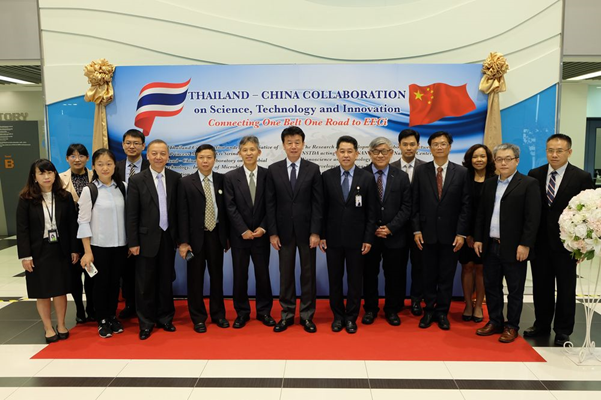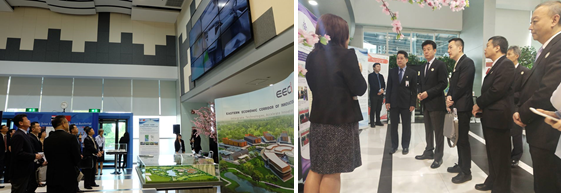On 12 December 2018, NSTDA President, Dr. Narong Sirilertworakul, and NSTDA executives welcomed the visit of Chinese delegation led by H.E. Zhang Jianguo, Vice Minister for Science and Technology. The study tour was part of the 22nd Session of the Thailand-China Joint Committee on Scientific and Technical Cooperation hosted by Thailand from 8 – 12 December 2018.

The delegation was guided through an exhibition displaying various cooperative projects carried out by NSTDA and Chinese agencies. Active projects include:
- CAS-Thailand Collaboration under the Initiative of HRH Princess Maha Chakri Sirindhorn. Resulting from visits to CAS by Princess Sirindhorn, dialogues between Thai agencies and the Chinese Academy of Sciences (CAS) have been initiated and led to a number of bilateral collaborations established since 2007 involving 13 CAS institutes and 11 Thai research and academic institutes. In 2008, the University of the Chinese Academy of Sciences (UCAS) and Thailand’s Office of the Civil Service Commission (OCSC) established a scholarship program for Thai students to enroll at UCAS. From 2009 to 2018, 32 scholarships have been granted and among these, 14 have graduated in various disciplines, enormously contributing to manpower development to advance Thai S&T.
- Thailand-China Technology Transfer Center. Established in 2015 at NSTDA, this center has been instrumental in facilitating technology transfer and dialogues between companies in Thailand and China. The Center regularly organizes activities to strengthen collaboration between Thai and Chinese enterprises encompassing a wide range of industry from seed industry, to IT and bio-medicine.
- Thailand-China Joint Research Center on Railway System. The center was formed between three parties: CRRC Corporation Limited (China), Thailand Institute Scientific and Technological Research (TISTR) and NSTDA. The collaborative work with NSTDA emphasizes railway operation control and driving simulation.
- Thailand-China Joint Laboratory on Microbial Biotechnology. Launched in October 2018 in Thailand, this joint lab is the collaboration among three institutes: BIOTEC-NSTDA, TISTR and the Institute of Microbiology, CAS. The joint lab carries out research to maximize the potential application of microorganisms.
- Chinese-Thai/Thai-Chinese Machine Translation System. Jointly developed by NECTEC-NSTDA and the Institute of Computing Technology (ICT), CAS, the Chinese-Thai/Thai-Chinese Machine Translation System is designed for general users, particularly tourists. The system currently contains more than 400,000 sentences used in daily life including general greetings, food and drink vocabularies and etc.
- Indoor Localization System with Bluetooth Low Energy (Unai). NECTEC-NSTDA and Shanghai Advanced Research Institute (SARI), CAS developed this system which can provide online location or moving direction data of an object or person within the building. The platform contains the signal transmitting and receiving devices, using the small embedded system and the Bluetooth Low Energy wireless communication system with Wi-Fi network in the building. The location data can be retrieved from the electronic plate thus render various applications such as in the warehouse or transportation tracking.
- Crop Monitoring System. Since January 2018, NECTEC-NSTDA has been collaborating with the Institute of Remote Sensing and Digital Earth, the developer of CropWatch, a global crop monitoring system. The cooperation aims to combine the knowledge from Thai side (nation-wide surveillance and local sensing information) and Chinese side (vegetation index, vegetation health index, vegetation condition index) to develop a better function of crop monitoring system that can support the needs of agricultural sector in any part of the world.
- Robotic Rehabilitation System for Patients with Muscle Weakness. Wrist-Elbow-Forearm Robotic Economical Rehabilitation System or WEFRE was developed by NECTEC-NSTDA for patients with muscle weakness or person who has the difficulty movement. WEFFRE was tested and analyzed among experimental patients with Spinal Cord Injury (SCI) and strokes during the clinical trial. The results showed that there were no statistical differences in pre-, post- and pre-post PROMS between the study and the control arms. To ensure the maximum accuracy of this system, the research team has extended their collaboration and knowledge exchange with Chinese partner from Shanghai Jiaotong University and Thai Hospital Network.
- Ecological Research. Since 2017, BIOTEC-NSTDA and Xishuangbanna Tropical Botanical Garden, CAS has collaborated on a project “Multi-disciplinary research on the mechanisms driving community assembly along a tropical latitudinal gradient in Indo-China Peninsula”. The main objective is to study patterns of functional diversity along a tropical latitudinal gradient in the Indo-China peninsula where there is a distinct environment gradient, interspersed with a number of more abrupt climatic gradients mediated by topography and oceanic currents. A study site is located at Mo Singto Forest Dynamics Plot, Khao Yai National Park.
- Nanoscience and Technology. Since 2013, NANOTEC-NSTDA and the National Center for Nanoscience and Technology (NCNST), CAS have been exchanging information and research staff, as well as co-supervising a Thai PhD student studying at UCAS.
- Corrosion Research. MTEC-NSTDA and the Institute of Metal Research (IMR), CAS have been in collaboration in the area of corrosion technology, with an active research project to construct a modeling framework for titanium aluminide (TiAl) alloying and evaluate the effect of alloying addition on the structure of TiAl.


In addition to joint projects, the delegation was briefed on NSTDA recent initiatives such as the Eastern Economic Corridor of Innovation (EECi) and National Biobank, and given a tour to research facilities and Electrical and Electronic Product Testing Center (PTEC) located at Thailand Science Park.
